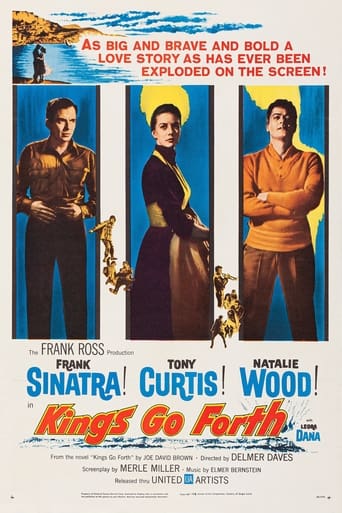HotToastyRag
Am I the only one who sees Natalie Wood as an all-American girl? It's ironic, since she was born Natalia Zakharenko, but I never understood why Hollywood cast her in "mixed" roles. Not to dis West Side Story, but I didn't believe for one second she was Puerto Rican. In Kings Go Forth, Natalie plays a French girl who "passes for white". Yes, I could have phrased it differently, but I was just trying to prepare you for the kind of language that's used in the film; there are some very politically incorrect lines of dialogue used by all three leads.Anyway, if you can get over the fact that Natalie Wood is supposed to be half-black, feel free to read more of the plot. A soldier on leave, Frank Sinatra meets and falls in love with Natalie, unaware of her parentage. They enjoy a very respectful, chaste courtship, and he's even met her mother—but then Natalie tells him her deep, dark secret. Frank isn't happy about it, and says he needs some time to think.Enter Tony Curtis, Frankie's pal and fellow soldier on leave. He's a notorious womanizer and also an all-around jerk, so when he starts showing interest in Natalie, the audience knows what mistake it will be if she returns his affections. With all the ridiculously dated parts to the story, I'll bring up an unrelated problem I have with the movie: In this love triangle, it's blatantly written out that Tony is the charming, attractive one and Frankie is not. Then why cast Frank Sinatra, the king of cool? If Frank Sinatra was interested in me, I wouldn't look twice at Tony Curtis.If you really like any of the three leads, you might want to check this out, because despite the horrifically dated script and Natalie Wood's terrible French accent, the acting is pretty good. But if this is the kind of story you'll find offensive, you might want to rent The Sweet Smell of Success or Some Came Running instead.
Dalbert Pringle
You know, from where I was sitting, I thought that this rather oddball, 1958, WW2 drama was really expecting just a little too much of the viewer by asking them to believe that Natalie Wood, as the Monique Blair character, was, in fact, half-black (or "Negro").I'd say that if Monique's father was, indeed, black (he is never seen in the movie), then, by looking at Natalie Wood who played his daughter, then he must've been the absolute most whitest looking black man on the entire face of the Earth. I kid you not! To me, the casting of Wood as Monique was a grave mistake, especially in a film whose story was apparently striving for believability. There was no way that she could've have ever convinced anyone that she had even a single drop of Negro blood in her veins.Had Wood's character been of mixed-race of, say, Japanese heritage, then, yes, I could've been convinced of that. But Negro!? Ha! No way, Jose!Other than that valid beef, this picture (concerning a decidedly silly, melodramatic love triangle) was corny, clichéd and too predictable (Hollywood-style) to be at all considered worthwhile entertainment.Set in and around a small town along the French Riviera, this film's attempt at dealing maturely with such issues as racism missed the mark, big-time.Though it did contain some intense battle scenes (seemingly thrown in for good measure), these, in turn, did nothing to alleviate the overall monotony that prevailed in this trite, little soap opera.
TCManiacs
Basically I enjoyed the movie and would recommend watching, but there were some major flaws that prevent me from calling it a great movie. In my opinion the basic plot was novel and appealing, but there are some glaring problems with the movie. The first problem was the substitution of a well written dialog, with the monotonous voice over by Sam; Frank Sinatra's character was used as a narration throughout the entire movie. Despite some decent lines from the character, Monique, Natalie Wood's French accent made me cringe each time she spoke. The story line of the two soldiers seeking the affections of a woman that turns out to be biracial was intriguing. A story explaining the reality of interracial love was novel for those days. The movie courageously lets Monique use the "n" word when she exclaims, "I guess 'nigger' is one of the first words you learn in America, isn't it?" Then Sam's character realistically illuminates American racism through his initial reaction to learning the girl he loves is part Negro. Unfortunately, the overall story lacked unity, the plot was forced and the sequence of events seemed unnatural. For example, the way Monique suddenly turns all of her attention to Britt during the first date with Sam after he had made her so happy with his return and acceptance her blackness was not realistic. It made the supposedly sensible good girl, Monique turn fickle and the otherwise dominating lieutenant, Sam turn passive as he set back and let the charming handsome Britt, Tony Curtis, take over his date.Although the film was classified under the war movie genre, the parallel plot involving Allied military operations was disconnected and irrelevant to the primary romantic drama. In fact the battle scene with the Germans seemed created just for an opportunity for Sam to extract vengeance on Britt lying about his intentions with Monique. After Sam's long narration on his intent to kill Britt, I felt frustrated and disappointed when he fails to take advantage of the perfect opportunity to carry out his vengeance with the dead Germans gun. Although, it may have been quite natural that he could have decided not sully his own character by resorting to murder, I don't think he would have forgiven Britt's transgression just because Britt admits his own lack of character. Despite these flaws, the unique story and the three starring actors make this movie worth watching.***I won't revise my original post, but I will make an addendum now that I have knowledge that the screenplay was based on novel by Joe David Brown. The book was written in stream of consciousness, which explains the heavy narration and limited dialog. The movie script has significant deviations from the books plot which explains its disjointed flow and unnatural character evolutions. I'd like to find a documented reason for the change from the books ending.
bkoganbing
Kings Go Forth is one of, maybe the only, film about the Allied offensive in Southern France in late summer of 1944. Several divisions who were fighting in Italy under Mark Clark were sent to invade France from the south. The action as compared to the larger shows movie east from Normandy and north up the Italian peninsula was light as the Germans were retreating to protect their own borders. It was called the champagne offensive because it was as you see it with Frank Sinatra and Tony Curtis, fighting one minute, and on a weekend pass the next.Frank Sinatra narrates the story with him as one of the protagonists. He's an army lieutenant and he's just gotten some replacements for his company, one of them being Tony Curtis. Curtis is a spoiled rich kid, a real smooth operator. But he turns out to be a good soldier and he and Sinatra become friends despite Sinatra being an officer and Curtis non-com. Then the two of them get interested in the same girl, Natalie Wood. She's an American expatriate living with her widowed mother, Leora Dana. Her father was a black man and they left the United States many years before to escape ruling prejudices. Ironic that they escape to France and then France gets occupied by the real prejudice merchants.The film is divided equally, half of it concerning the war and half of it dealing with the romantic triangle. For the second time in his career, the first being in Sweet Smell of Success, Tony Curtis plays a heel and does it well. Curtis was really coming into his own as a player and not just a pretty face. Kings Go Forth was filmed on the heels of his Oscar nominated performance in The Defiant Ones.Frank Sinatra gives one of his best screen performances in Kings Go Forth. None of the hipster slang, not the nebbish of his forties musicals, Sinatra plays a really good man trying to deal with his own inner conflicts about what he's been brought up to believe and the feelings he has for Wood. It's something different and Sinatra does it well.Natalie Wood was as beautiful as they come and Leora Dana as her mother who's seen too much of the world and is determined to protect her daughter has some of her best screen moments. Tony Curtis liked working with Natalie Wood very much in the films they made together, but he does mention in his autobiography it would have really been great if someone like Dorothy Dandridge had been cast in her role. It might have made Kings Go Forth better remembered today, as much as classic as Guess Who's Coming To Dinner.Elmer Bernstein did the film score and one of the themes was given a lyric by Sammy Cahn and became the song Monique after Natalie Wood's character. Frank Sinatra made a hit record of it though it is only heard instrumentally in the film. It's one of his loveliest ballads.Viewers should see the film before hearing Sinatra's record of it. The whole premise of the film is the plain Sinatra and the smooth Curtis competing for Wood. You hear old Blue Eyes sing Monique and you'll find it hard to believe why he didn't just sing that song. Why Natalie would have melted right away in his arms.


 AD
AD





